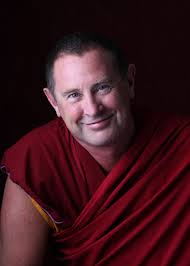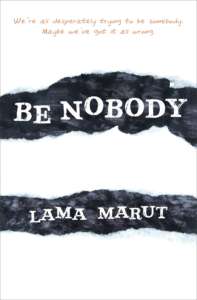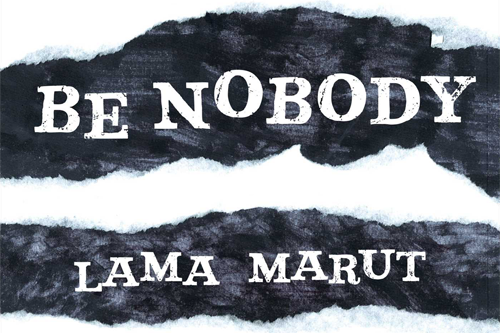 The subtitle of Lama Marut’s new book, Be Nobody
The subtitle of Lama Marut’s new book, Be Nobody(Beyond Words), encapsulates the quandary of its contents: “We’re all desperately trying to be somebody. Maybe we’ve got it all wrong.”
Being a “nobody” would seem to be a mark of failure rather than a goal in our overachieving and hyper-busy world. Why would we want to dismantle this self we take such pride in and are trying to improve each day? How can we erase our identity and essence? How can the self negate itself, and who or what would be left to observe the results?
If asked to define ourselves, most of us would produce a list of characteristics: age, gender, occupation, hometown, political beliefs, spirituality, family structure, body type, and so on. Some of these could be construed as achievements, and others are pure happenstance. Lama Marut challenges us to realize that all of these are not much more than carnival cutouts, holes through which we poke our head in order to become a strong man or a mermaid for a funny photograph. If this is true, then whose head is poking through the hole?
None of our prideful achievements like bonuses, promotions, and beauty queen sashes were with us at birth, and most will fade or diminish before we die. Does our most valuable self die along with them? Can we transcend the bounds of our personal myth and expand beyond the limits of our own identity?
Thinking of ourselves as smart or beautiful implies that that we consider someone else to be less so. Each one of our defining characteristics is a constraining filter: If we are Republican, we are not Democratic; if we are easygoing, we are not high-strung. We limit ourselves when we define ourselves in this isolating, individualistic way. None of our prideful achievements like bonuses, promotions, and beauty queen sashes were with us at birth, and most will fade or diminish before we die. Does our most valuable self die along with them? Can we transcend the bounds of our personal myth and expand beyond the limits of our own identity?
The answer and the escape have already been given to us. We each have an essence, a kernel of primary being that is completely transcendent and unencumbered, forever free. It is the birthright of everyone, equally present in all. Lama Marut calls this the “nobody self,” but it has also been described as Buddha Nature, the Spirit of Christ, or the Quaker “Light Within.” This is the nobody that we want to cultivate; it is the “head” that pokes through the carnival cutouts during its jolly time on earth. Lama Marut tells us that the “nobody self” was never born and can never die. It is undefinable because any definition is limiting by nature. It is perfect in itself. We can access it only in relation to others, swept up in love, empathy, or enthusiasm that carries us beyond ourselves. We’ve already seen the “nobody self” in action, in the mother comforting her infant or in an empathetic silent hug at a memorial service. The “nobody self” has no need for aggrandizement or defensiveness.
So how can we “be nobody”? We can never completely shed our “somebody self,” but we can train it and guide it to seek the best choice in each situation that arises. Lama Marut uses a wrestling smack-down metaphor (“Rage in the Cage”) to suggest how aggressively we should combat the “somebody self’s” perpetually needy nature. As he also informs us, “It’s not really ‘self-improvement’ if it’s all about you.” We won’t find our true liberation in seeking out the bigger, the better, and the new to add to our list of achievements. Jesus taught it this way: “Lay up for yourselves treasures in heaven, where neither moth nor rust doth corrupt, and where thieves do not break through nor steal. For where your treasure is, there will your heart be also.”
The “somebody self” and the “nobody self” are two sides of the same coin that is you. Lama Marut writes that the self is ultimately a process, not a thing, like the flow of a river. If we can master the flowing dance between the “somebody self” and the “nobody self,” then we can achieve a deep happiness and inner peace that will sustain us through the inevitable vagaries of life, approaching it all with lightness, humor, and love.
As Lama Marut puts it:
“Remember, they say nobody’s perfect.
So why not be nobody?”
 Lama Marut (a.k.a. Brian K. Smith) is extensively trained in the spiritual traditions of India and Tibetan Buddhism. He holds a Ph.D. in Comparative Religion and taught for more than two decades, at Columbia University and the University of California. Lama Marut is currently the spiritual director of eight Middle Way Centers in North America, Australia, and Singapore.
Lama Marut (a.k.a. Brian K. Smith) is extensively trained in the spiritual traditions of India and Tibetan Buddhism. He holds a Ph.D. in Comparative Religion and taught for more than two decades, at Columbia University and the University of California. Lama Marut is currently the spiritual director of eight Middle Way Centers in North America, Australia, and Singapore.
In the following excerpt, Lama Marut describes the importance of finding one’s own path through the maze of spiritual traditions.
So the question of what or who I am when it comes to religion is not entirely clear—even, or especially, to me. Am I a Christian, a Hindu, or a Buddhist? Is it important or even necessary to pick just one? How could I just erase years of experience with any one of these three main influences on my personal spiritual life?
Many readers are probably at least as religiously complicated as I am. So many of us nowadays are religious hybrids, blended composites and combinations of a number of religious and philosophical traditions—spiritual mongrels, if you will. Even those of us who closely relate to one or another of the world’s religions have been exposed to and influenced by other religions in ways that are unprecedented in world history.
In the days of yore, most people lived in closed societies and were more excusably parochial, provincial, and unaware of the whole range of religious and cultural alternatives. Our world is a much bigger and more diverse place. We live in a global community of instantaneous communication and the World Wide Web; we reside in nation-states that are increasingly multicultural and religiously heterogeneous. The containers in which we once kept ourselves are now leaking all over the place.
We know way more about each other than ever before, and none of us is left unaffected by the mutual influencing and syncretistic blending that’s occurring on all kinds of levels. There are significant ramifications of such intermingling when it comes to a spiritual life that isn’t futilely trying to stay cloaked in “that old-time religion.”
These days, claiming a religious identification (or refraining from doing so) is an option, not just an unalterable accident of birth. While we may have been born and brought up as one thing or another (or without any religious training at all), we now exercise more choice than ever before about our personal beliefs, identities, and spirituality.
Fully 44 percent of Americans currently say they have a religious affiliation different from the one they were born into. No matter which religion our parents or guardians identified with, we spiritual crossbreeds now easily slip out of one category and into another.
 And in addition to all of us spiritual mongrels, there are increasing numbers who disavow any religious affiliation whatsoever. This trend toward religious non-identification is growing. One recent study has predicted that organized religion is an endangered species—probably “set for extinction”—in no less than nine of the world’s developed nations: Australia, Austria, Canada, the Czech Republic, Finland, Ireland, the Netherlands, New Zealand, and Switzerland. Another poll indicates that nearly two-thirds of those living in Great Britain no longer regard themselves as religious.
And in addition to all of us spiritual mongrels, there are increasing numbers who disavow any religious affiliation whatsoever. This trend toward religious non-identification is growing. One recent study has predicted that organized religion is an endangered species—probably “set for extinction”—in no less than nine of the world’s developed nations: Australia, Austria, Canada, the Czech Republic, Finland, Ireland, the Netherlands, New Zealand, and Switzerland. Another poll indicates that nearly two-thirds of those living in Great Britain no longer regard themselves as religious.
Even in the United States, a country that is statistically much less disenchanted with institutionalized religion than most of Europe and other parts of the developed world, thirty-three million Americans now claim no formal religious association. According to a recent survey conducted by the Pew Forum on Religion and Public Life, the “nones” (“none of the above,” the religiously nonaffiliated) are the fastest-growing group in America—increasing by 25 percent in just the past five years—and they’re the only demographic that is expanding in every state. And the numbers are largest among younger people. According to the poll, 30 percent of the “older millennials,” born between 1981 and 1989, are counted among the “nones”; among the “younger millennials”—those born between1990 and 1994—34 percent are religiously unaffiliated.
Living an ethical life—a life of selflessness rather than unbridled egoism, of integration and interconnection rather than alienation and myopic narcissism—is not just for those who choose to follow one or another of the established religions. It is the key to true happiness for any individual, and the foundation for creating a better world.
In addition to the religiously affiliated, the spiritual mongrels who have been shaped by several traditions, and the “nones” who prefer to remain religiously unidentified but spiritually alive, there is another category of those trying to live the good life in today’s changed world. We can call them the “undos.”
“Undos” are those of us who are trying to break free from the confines of religious labeling without jettisoning the helpful teachings and methods found in those traditions. Being an “undo” is not quite the same as being a “none.” Divesting oneself of a particular religious designation presumes that you have had one to begin with—that one has been trained in one or another of the world’s spiritual traditions. To be an “undo,” a person must first have been a Hindu (or a Buddhist, Christian, Jew, Muslim, Sikh, or whatever). But having steeped him- or herself in this or that tradition, the “undo” chooses to drop the shell of religious identification in order to try just to be a good human being rather than an upstanding, card-carrying member of any one particular faith.
Whatever the label—affiliated, mongrel, none, or “undo”— growing numbers of people are seeking a meaningful existence outside the confines of the traditional religious identities associated with “that old-time religion.” In light of such trends, the Dalai Lama recently declared (on his Twitter stream, no less!) that he is “increasingly convinced that the time has come to find a way of thinking about spirituality and ethics beyond religion altogether.” In his recent book Beyond Religion: Ethics for a Whole World, the Dalai Lama outlines a program for how to live the good life that presumes “religion alone is no longer adequate” for the task:
One reason for this is that many people in the world no longer follow any particular religion. Another reason is that, as the peoples of the world become ever more closely interconnected in an age of globalization and in multicultural societies, ethics based on any one religion would only appeal to some of us; it would not be meaningful for all….What we need today is an approach to ethics which makes no recourse to religion and can be equally acceptable to those with faith and those without: a secular ethics.
Living an ethical life—a life of selflessness rather than unbridled egoism, of integration and interconnection rather than alienation and myopic narcissism—is not just for those who choose to follow one or another of the established religions. It is the key to true happiness for any individual, and the foundation for creating a better world. For “when you have ‘isms,’” as Lama Surya Das once said to me, “you have schisms.”
Too often, however, the identification with one or another of the institutionalized religions has become just another excuse to rehearse the need to be somebody in the ego’s never-ending appetite for self-aggrandizement. When, in truth, the founders of the different religions of humankind become founders only retroactively. They weren’t teaching “isms,” they were only conveying their understanding of life, of what is.
And if there’s one thing we know about the great spiritual exemplars of history, it’s that they were humble. We don’t admire and canonize people who pose as self-important and superior. There is no “Saint Barry the Arrogant” or “Saint Tricia the Pompous.” Our paragons of the past, as well as the present, are those who seem truly willing to be nobody, to be the servants, not the masters, of others.
The point is not to be a Buddhist but to learn how to become a Buddha; not just to identify with the label “Christian” but to live a Christ-like life; not simply to join a religion as a way to strengthen one’s sense of self but to actually live a good life, a life characterized by egoless concern for others.
“I am not a Hindu, nor a Muslim am I!” declared the fifteenth-century Indian mystic Kabir. “I am this body, a play of five elements; a drama of the spirit, dancing with joy and sorrow.” Saint Paul similarly asserted in Galatians, “There is neither Jew nor Greek, slave nor free, male nor female, for you are all one in Christ Jesus.” The Buddha, it is said, “did not teach any religion at all.” The practice of any spiritual path—whether or not it is designated as such by one or another of the usual trademarks—should lead not toward the elevation of the ego but rather to the self-negation and destruction of vanity that’s entailed in being nobody.
What? Be nobody? I’ve spent my whole life trying not to be just a nobody!
This excerpt was taken from Be Nobody by Lama Marut and reprinted with permission of Beyond Words Publishing/Atria Books, Hillsboro, Oregon.




1 Comment
Tara Green
What an excellent piece! Thanks for posting.